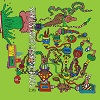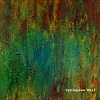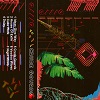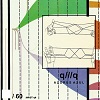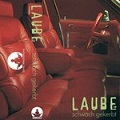German Army. Such an odd namesake. Certain punctuations in history make it a loaded reference. But depending on which side of history the reference falls, we are encouraged to imagine drastically contrasting entities. Unfortunately this Inland Empire duo is not big on encouragements, but appear more interested in remaining obscure behind a sheer barrage of tracks, begetting releases, begetting labels. After a blitz of submissions from the band, I can now say I know even less than I once did (having speculated), and the German Army project seems to extend well beyond the sum of its recorded, mostly plastic, parts.
 As with most of their albums, the ‘Barrineans’ C30 features more than ten tracks (with over ten releases in the last two years, you might appreciate how the details start getting lost). Seeking out “singles” is a fool’s errand, though on the flipside, nearly all the material is radio-friendly. Of these three tapes, ‘Barrineans’ is the most neatly electronic: the beats are clean, evenly paced and spaced, allowed to resonate in a way that make them syrupy, at times even danceable. It’s what would have happened if we had Excepter with no !!! as counterbalance. This is the clearest demonstration of tribalism infused into all of these releases, with their cadres of respectable labels putting in elegant screen prints, glossy photos, and fancy support materials.
As with most of their albums, the ‘Barrineans’ C30 features more than ten tracks (with over ten releases in the last two years, you might appreciate how the details start getting lost). Seeking out “singles” is a fool’s errand, though on the flipside, nearly all the material is radio-friendly. Of these three tapes, ‘Barrineans’ is the most neatly electronic: the beats are clean, evenly paced and spaced, allowed to resonate in a way that make them syrupy, at times even danceable. It’s what would have happened if we had Excepter with no !!! as counterbalance. This is the clearest demonstration of tribalism infused into all of these releases, with their cadres of respectable labels putting in elegant screen prints, glossy photos, and fancy support materials.
 In purely musical terms, the ‘T’rung’ C40 evokes the most evidence of a tribal sound. The whole thing lives in the middle range – I have yet to hear something from the band that wasn’t decidedly low-fidelity – and sounds as though it was played mostly on homemade instruments and recording equipment on its last legs. A peak behind the process would be fascinating, especially if it could answer where, exactly, are these sounds coming from? The structure of these tunes evokes Peter Murphy at his most endeavoring (and least committed to tape), only helping to hone the era of this synthetic genre.
In purely musical terms, the ‘T’rung’ C40 evokes the most evidence of a tribal sound. The whole thing lives in the middle range – I have yet to hear something from the band that wasn’t decidedly low-fidelity – and sounds as though it was played mostly on homemade instruments and recording equipment on its last legs. A peak behind the process would be fascinating, especially if it could answer where, exactly, are these sounds coming from? The structure of these tunes evokes Peter Murphy at his most endeavoring (and least committed to tape), only helping to hone the era of this synthetic genre.
 The Army’s most recent release, the ‘Millerite Masai’ C45, is for me the most compelling – literally, compelling, by the prominent inclusion of guitars which force the music along with a common, steel-wound thread. The (alternating) drives and dirges of bass and lead guitars often veer close to the relentless new Industrialism of Vatican Shadow, with even more secretive plans in mind. Brought together with the song titles (each release is littered with semi-coherent names – make that provocations – which beg contemplation independent of the sounds in the machine), we get an anthropologist’s fever dreams stitched together in heavy yarn, perhaps some new dawning ambient music for our recursive musical economy.
The Army’s most recent release, the ‘Millerite Masai’ C45, is for me the most compelling – literally, compelling, by the prominent inclusion of guitars which force the music along with a common, steel-wound thread. The (alternating) drives and dirges of bass and lead guitars often veer close to the relentless new Industrialism of Vatican Shadow, with even more secretive plans in mind. Brought together with the song titles (each release is littered with semi-coherent names – make that provocations – which beg contemplation independent of the sounds in the machine), we get an anthropologist’s fever dreams stitched together in heavy yarn, perhaps some new dawning ambient music for our recursive musical economy.
What is the over-arching lesson? Beats me. Throbbing Gristle, Coil, a bit of Gate. The lowest common denominator is often a wobbly, minimal beat and some incoherent murmurs from a de facto vocalist. The beats often disaggregate from the rest of the music, spinning the listener into an ambivalent chaos. Perhaps the biggest surprise about this German army is their occupation of a place not in days of blood and subterfuge, nor the current state of green and centrifuge, but right in between, in the Cold War. There are definitely strains of Stasi paranoia, and deconstructive rebellion (a la Einstürzende Neubauten) from the heart of the home of the battle; but so are there the residual effects of Francophone cold wave, anti-Thatcherite dub, and Reagan era nihilism. The suburbs of San Bernadino are, after all, still riding that belly-flop wave of American fear and loathing, loaded on McDonald’s and bankruptcy. Perhaps for this Germany Army in the midst of mass murder and economic devastation, asking for lessons learned is asking for too much.
Lava Church cassette
sold out
HERE
Lighten Up Sounds cassette
$6
HERE
Yerevan Tapes cassette
6€
HERE
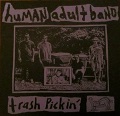 The Butthole Surfers of the East coast are at it again. Not that region matters all that much when you’re living the dream of what punk could have been. This two song 45rpm 7” hits the perfect pitch of post-punk grunge which had the smart ones shouting ‘the Americans are coming!’ in 1987. Think of The Surfers, The Cows, Truman’s Water. Maybe not something you’d expect to come out of New Brunswick, but maybe I’m overthinking it for you. Albini-meanie but foremost about rock and roll like San Diego’s fluf, Trevor Pennsylvania sings about his muse on “Garbage & th’ Trees.” It’s got AmRep brutality and Subterranean Pop irony. “Night Terrors” is suitably darker, splicing anthemic verses with a steely-cold spasm in between – a rare moment of instrumental freedom for the Human Adult Band, and the only place no trace of humor can be found. Sometimes dreams can be the harsher reality. On black vinyl with a sleeve and sticker. On the cheap for a limited time!
The Butthole Surfers of the East coast are at it again. Not that region matters all that much when you’re living the dream of what punk could have been. This two song 45rpm 7” hits the perfect pitch of post-punk grunge which had the smart ones shouting ‘the Americans are coming!’ in 1987. Think of The Surfers, The Cows, Truman’s Water. Maybe not something you’d expect to come out of New Brunswick, but maybe I’m overthinking it for you. Albini-meanie but foremost about rock and roll like San Diego’s fluf, Trevor Pennsylvania sings about his muse on “Garbage & th’ Trees.” It’s got AmRep brutality and Subterranean Pop irony. “Night Terrors” is suitably darker, splicing anthemic verses with a steely-cold spasm in between – a rare moment of instrumental freedom for the Human Adult Band, and the only place no trace of humor can be found. Sometimes dreams can be the harsher reality. On black vinyl with a sleeve and sticker. On the cheap for a limited time!
